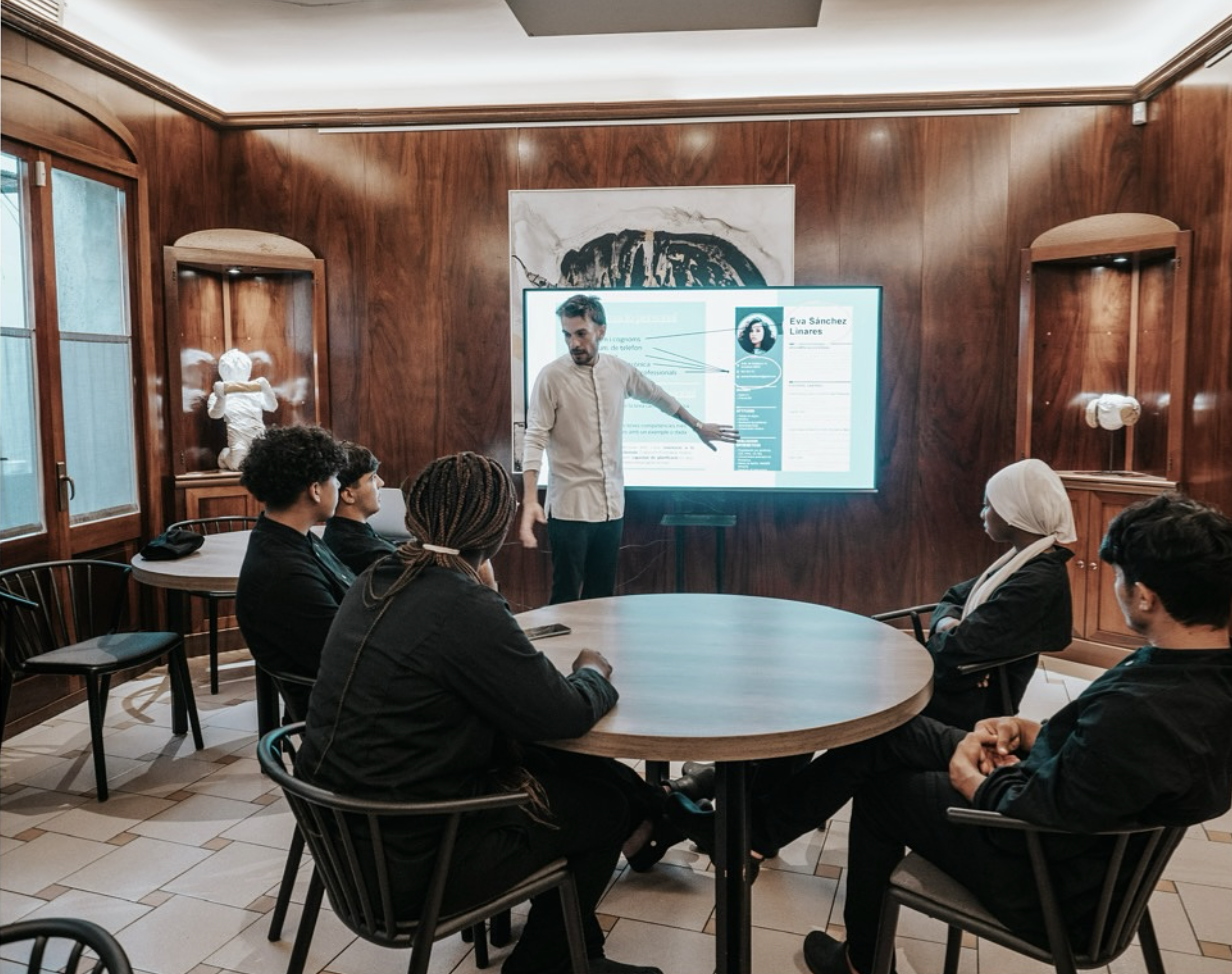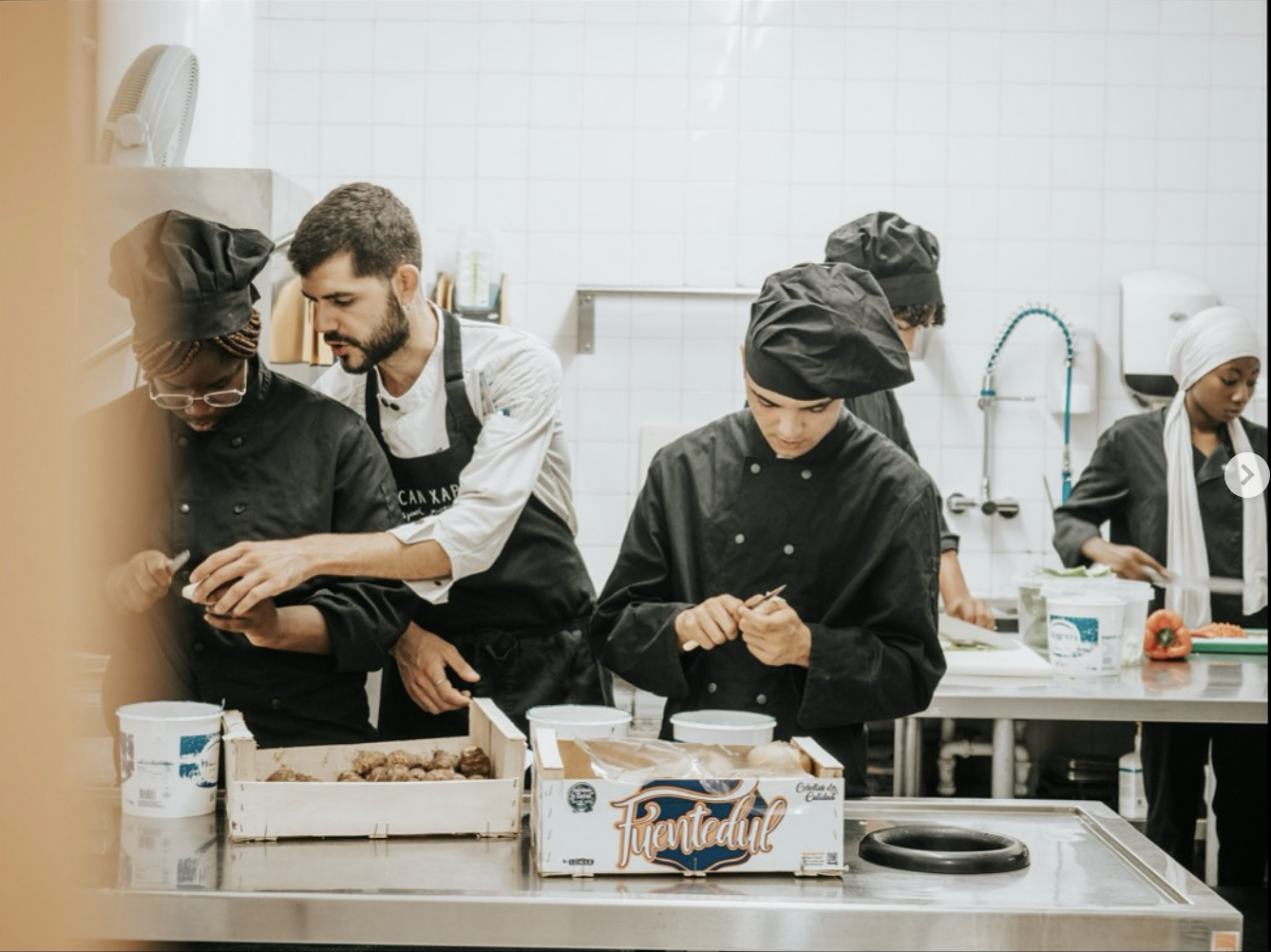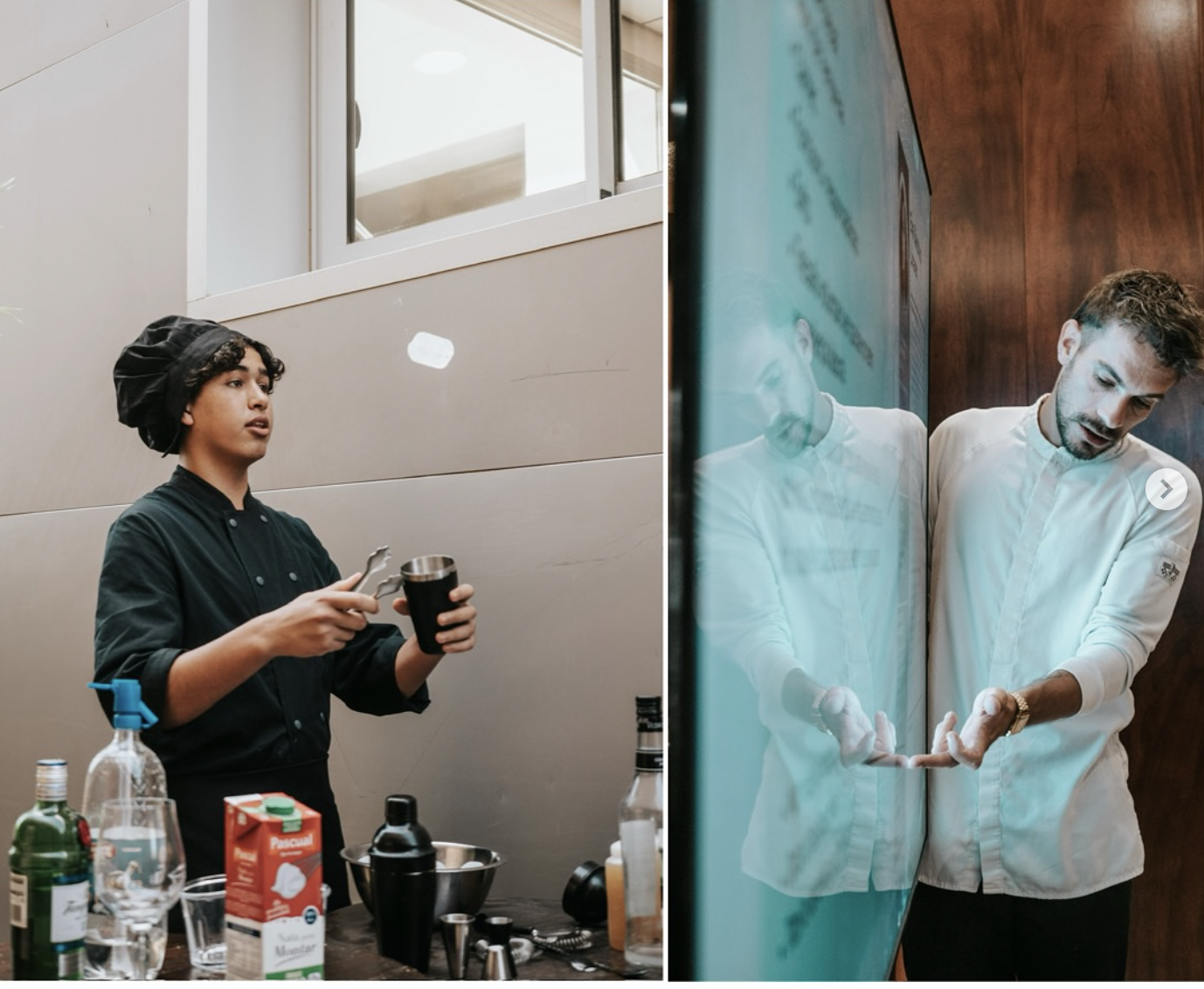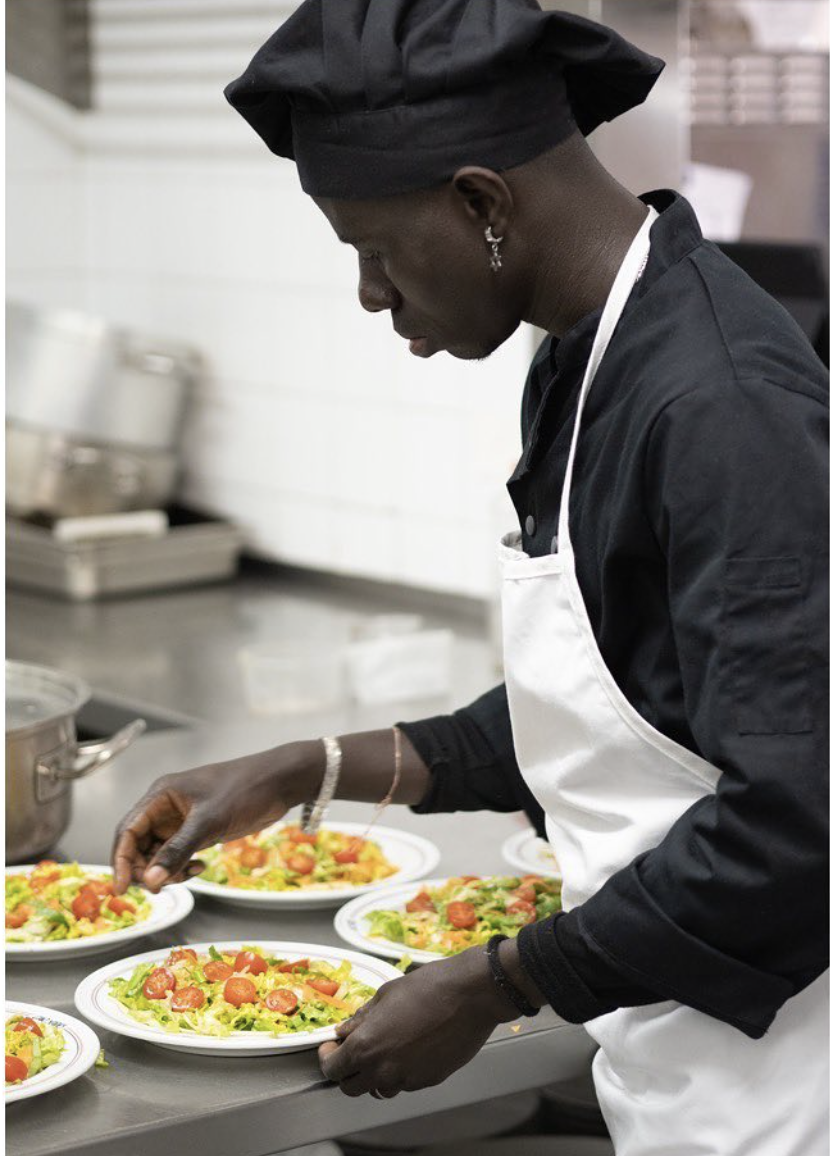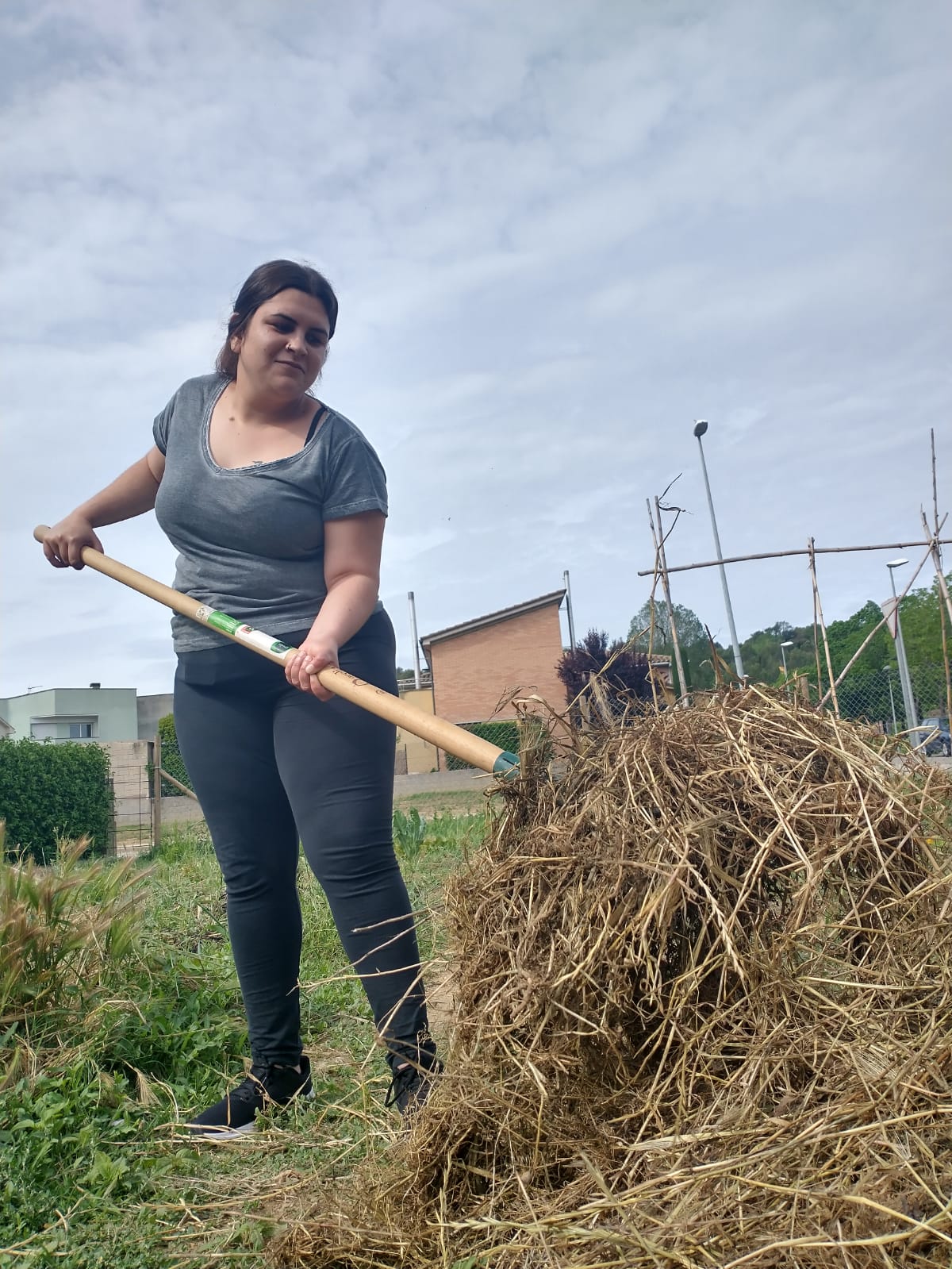Prioritising the places and people that need it the most
TR3S ACCIONS
Tr3s Accions "Learn, experiment & decide"
Since 2006, Tr3s Accions programme empowers vulnerable youth, helping them re-enter the educational or laboral system. To ensure educational or laboral market success, it develops both professional and social skills essential for employment.
Focused on the restaurant sector, training takes place at Can Xapes restaurant, offering real experience in a safe space. The programme is free and runs annually, open to all young people regardless of their economic, social or documentation situation
Focused on the restaurant sector, training takes place at Can Xapes restaurant, offering real experience in a safe space. The programme is free and runs annually, open to all young people regardless of their economic, social or documentation situation
Spain
Local
Girona and Bañolas (Catalonia, Spain).
It addresses urban-rural linkages
It refers to other types of transformations (soft investment)
Yes
2024-12-22
No
No
No
As a representative of an organisation
Tr3s Accions implements a program focused on prevention, training, and support for young people to foster social inclusion and reduce risk situations. It addresses barriers that hinder their participation in community life, promoting fairness, equality, and social cohesion
The project supports young people facing difficulties in accessing education or entering the labor market, often lacking emotional, educational, legal, or employment-related resources
To address this, we offer a training and support program that enhances employability through vocational training, transversal skills, and social abilities. Culinary training, based on real-life experience in a professional setting, forms the core of the program, enabling participants to gain independence
Overall aim
1 To support young people in their life journey through training, education, and guidance, enhancing their skills and abilities to promote their personal growth and development
2 To enhance the employability of the young people we support by facilitating their entry into the labor market or their reintegration into the formal education system and/or accredited training programs
Target group
Young people aged between 16 and 23 years old:
Who have difficulty accessing resources that meet their needs
With either regular or irregular administrative status
Who are in a phase of inactivity in terms of employment and/or education
With learning difficulties
Specific Obj
To provide technical training in learning a trade
To increase the social and cultural participation of young people in the community
To provide guidance in personal development and educational processes
To support the young person in the job search
70% of the participants have secured their first job contract or resumed their academic education
Participants have taken part in 10 community activities
77% of the participants have improved their transversal skills
82% of the young participants completed their internships
The project supports young people facing difficulties in accessing education or entering the labor market, often lacking emotional, educational, legal, or employment-related resources
To address this, we offer a training and support program that enhances employability through vocational training, transversal skills, and social abilities. Culinary training, based on real-life experience in a professional setting, forms the core of the program, enabling participants to gain independence
Overall aim
1 To support young people in their life journey through training, education, and guidance, enhancing their skills and abilities to promote their personal growth and development
2 To enhance the employability of the young people we support by facilitating their entry into the labor market or their reintegration into the formal education system and/or accredited training programs
Target group
Young people aged between 16 and 23 years old:
Who have difficulty accessing resources that meet their needs
With either regular or irregular administrative status
Who are in a phase of inactivity in terms of employment and/or education
With learning difficulties
Specific Obj
To provide technical training in learning a trade
To increase the social and cultural participation of young people in the community
To provide guidance in personal development and educational processes
To support the young person in the job search
70% of the participants have secured their first job contract or resumed their academic education
Participants have taken part in 10 community activities
77% of the participants have improved their transversal skills
82% of the young participants completed their internships
vocational training
empowerment
comunity spirit
inclusion
learning by doing
First of all, it should be highlighted that our restaurant, where a large part of the project is developed, received the "Chef 2022 and Sustainability" award for the uniqueness of its social and gastronomic project.
All the young people from Tr3s Accions receive training in the module of Food Sustainability, in order to learn the rules of recycling and food waste prevention.
Each year, the restaurant and the school actively participate in the Gastrorecup initiative, a program designed to raise awareness about food waste and the significant amount of food lost throughout the food supply chain.
In the week leading up to the event, both professionals and students collaborate to recover food that would otherwise be discarded. This rescued food is then repurposed to create meals for a community dinner, demonstrating how surplus food can be effectively utilized.
The project not only educates participants about the importance of food recovery but also promotes sustainable practices within the local community.
news:
-banyolestv.cat/index.php/pla-de-l-estany/52-salut/11439-can-xapes-de-cornella-del-terri-tornara-a-acollir-el-27-de-setembre-un-sopar-gastrorecup.html
-https://www.youtube.com/watch?v=emG2DLl12Mg
Throughout 2024, the students of Tr3s Accions collaborated with "Centre El Puig) to produce a hundred jars of bitter orange marmalade, using fruit collected from urban trees.
The oranges were harvested by the users of El Puig Center, a facility dedicated to people with disabilities, in collaboration with the students of Tr3s Accions. Afterwards, the Can Xapes team, together with the students, processed the fruit into marmalade, promoting sustainability and social inclusion through this initiative. https://www.diaridegirona.cat/comarques/2024/04/02/banyoles-restaurant-can-xapes-elaboren-100530062.html
Additionally, the organization’s office follows an optimized recycling procedure to ensure proper waste management and environmental responsibility.
All the young people from Tr3s Accions receive training in the module of Food Sustainability, in order to learn the rules of recycling and food waste prevention.
Each year, the restaurant and the school actively participate in the Gastrorecup initiative, a program designed to raise awareness about food waste and the significant amount of food lost throughout the food supply chain.
In the week leading up to the event, both professionals and students collaborate to recover food that would otherwise be discarded. This rescued food is then repurposed to create meals for a community dinner, demonstrating how surplus food can be effectively utilized.
The project not only educates participants about the importance of food recovery but also promotes sustainable practices within the local community.
news:
-banyolestv.cat/index.php/pla-de-l-estany/52-salut/11439-can-xapes-de-cornella-del-terri-tornara-a-acollir-el-27-de-setembre-un-sopar-gastrorecup.html
-https://www.youtube.com/watch?v=emG2DLl12Mg
Throughout 2024, the students of Tr3s Accions collaborated with "Centre El Puig) to produce a hundred jars of bitter orange marmalade, using fruit collected from urban trees.
The oranges were harvested by the users of El Puig Center, a facility dedicated to people with disabilities, in collaboration with the students of Tr3s Accions. Afterwards, the Can Xapes team, together with the students, processed the fruit into marmalade, promoting sustainability and social inclusion through this initiative. https://www.diaridegirona.cat/comarques/2024/04/02/banyoles-restaurant-can-xapes-elaboren-100530062.html
Additionally, the organization’s office follows an optimized recycling procedure to ensure proper waste management and environmental responsibility.
One of the key distinguishing features of this training program is the opportunity it provides participants to develop their professional competencies in a real work environment, specifically within a fully operational restaurant. This immersive methodology enables students to acquire industry-specific skills while working alongside experienced professionals, fostering experiential and accelerated learning.
The program offers a structured and supervised real-work setting, facilitating a gradual transition into the labor market. By employing a "learning by doing" approach, participants continuously apply newly acquired knowledge, thereby optimizing the assimilation of both technical and transversal skills. This methodology has demonstrated high effectiveness, achieving a 70% employment placement rate over the past year.
The Can Xapes gastronomic space features spacious, well-equipped facilities, specifically designed to enhance motivation and support students' professional development in both culinary and service areas. Training takes place in an environment where no distinction is made between industry professionals and trainees, ensuring seamless integration and fostering a collaborative work dynamic. This model promotes team cohesion and an optimal learning atmosphere, prioritizing an inclusive and supportive environment.
As the final stage of the training process, an evaluative real-service simulation is conducted. On this occasion, the restaurant is closed to the public for one evening, allowing students to independently organize and execute a full-service experience for their families, designing and preparing a bespoke tasting menu. This exercise provides a hands-on demonstration of the competencies acquired throughout the program, reinforcing participants’ readiness for professional integration into the hospitality sector.
The program offers a structured and supervised real-work setting, facilitating a gradual transition into the labor market. By employing a "learning by doing" approach, participants continuously apply newly acquired knowledge, thereby optimizing the assimilation of both technical and transversal skills. This methodology has demonstrated high effectiveness, achieving a 70% employment placement rate over the past year.
The Can Xapes gastronomic space features spacious, well-equipped facilities, specifically designed to enhance motivation and support students' professional development in both culinary and service areas. Training takes place in an environment where no distinction is made between industry professionals and trainees, ensuring seamless integration and fostering a collaborative work dynamic. This model promotes team cohesion and an optimal learning atmosphere, prioritizing an inclusive and supportive environment.
As the final stage of the training process, an evaluative real-service simulation is conducted. On this occasion, the restaurant is closed to the public for one evening, allowing students to independently organize and execute a full-service experience for their families, designing and preparing a bespoke tasting menu. This exercise provides a hands-on demonstration of the competencies acquired throughout the program, reinforcing participants’ readiness for professional integration into the hospitality sector.
Tr3s Accions is a training program designed to be economically accessible and entirely free of charge, thus removing financial barriers that often hinder access to professional training. No prior education is required, as both theoretical and practical training are individually tailored to each participant. This fosters an inclusive learning model based on the “design for all” methodology, integrating diverse pedagogical approaches that accommodate the specific needs, characteristics, and potential of each beneficiary.
The experiential learning approach enables knowledge acquisition for individuals with varying educational backgrounds and levels of training. Furthermore, the program is accessible to young people facing legal documentation challenges, offering an opportunity to those whose lack of official documentation may prevent them from continuing their education or accessing employment opportunities. Additionally, both the restaurant and the program’s administrative offices are fully adapted and comply with universal accessibility standards, ensuring equal access to training for people with disabilities.
Regarding participatory governance models, biweekly assemblies are held, allowing students to share their opinions, suggest improvements, and propose new initiatives. This mechanism ensures that specific aspects of the course can be adjusted to better meet participants’ needs and expectations. Similarly, in community-based activities, students take the lead in proposing and organizing initiatives within their immediate environment.
The program's 70% employment placement rate demonstrates its effectiveness in creating real opportunities for individuals facing barriers to entering the labor market. The integration of training within a fully operational gastronomic space makes this model scalable and adaptable to other national and European contexts, fostering new social dynamics based on equity and inclusion.
The experiential learning approach enables knowledge acquisition for individuals with varying educational backgrounds and levels of training. Furthermore, the program is accessible to young people facing legal documentation challenges, offering an opportunity to those whose lack of official documentation may prevent them from continuing their education or accessing employment opportunities. Additionally, both the restaurant and the program’s administrative offices are fully adapted and comply with universal accessibility standards, ensuring equal access to training for people with disabilities.
Regarding participatory governance models, biweekly assemblies are held, allowing students to share their opinions, suggest improvements, and propose new initiatives. This mechanism ensures that specific aspects of the course can be adjusted to better meet participants’ needs and expectations. Similarly, in community-based activities, students take the lead in proposing and organizing initiatives within their immediate environment.
The program's 70% employment placement rate demonstrates its effectiveness in creating real opportunities for individuals facing barriers to entering the labor market. The integration of training within a fully operational gastronomic space makes this model scalable and adaptable to other national and European contexts, fostering new social dynamics based on equity and inclusion.
The beneficiaries play a key role in the development and evolution of the project. Throughout the year, participatory meetings are held where young people can express their opinions and actively contribute to improving the programme. In these meetings, they have the opportunity to influence aspects such as the structure of the training sessions, the choice of institutions for their internships and the planning of community activities.
Their involvement also extends to the communication and visibility of the project. Participants decide on the use of their images in photographs and videos, the type of audiovisual content produced and the posts published on social media such as Instagram. This participation not only ensures respect for their privacy and autonomy, but also fosters a sense of belonging and empowerment within the programme.
At the end of the course, participants complete an anonymous survey where they can give feedback on the training, support, community activities and professionals who have been part of their process. Once they complete the course, young people who have finished the program become part of an internal job pool.
Additionally, renowned professionals in the sector, such as Ferran Adrià or Roca brothers, have participated in motivational sessions for young participants, sharing their experience and expertise to inspire them in their professional development.
Civil society also plays a crucial role in the employability of participants. Companies in the sector cooperate with the programme by offering mentorship, internships and job opportunities. We currently have a network of over 12 organisations where students can gain their first work experience.
By 2025, we aim to establish a group of participant representatives who meet regularly with the project team to make proposals, assess the impact of actions, and identify new needs.
Their involvement also extends to the communication and visibility of the project. Participants decide on the use of their images in photographs and videos, the type of audiovisual content produced and the posts published on social media such as Instagram. This participation not only ensures respect for their privacy and autonomy, but also fosters a sense of belonging and empowerment within the programme.
At the end of the course, participants complete an anonymous survey where they can give feedback on the training, support, community activities and professionals who have been part of their process. Once they complete the course, young people who have finished the program become part of an internal job pool.
Additionally, renowned professionals in the sector, such as Ferran Adrià or Roca brothers, have participated in motivational sessions for young participants, sharing their experience and expertise to inspire them in their professional development.
Civil society also plays a crucial role in the employability of participants. Companies in the sector cooperate with the programme by offering mentorship, internships and job opportunities. We currently have a network of over 12 organisations where students can gain their first work experience.
By 2025, we aim to establish a group of participant representatives who meet regularly with the project team to make proposals, assess the impact of actions, and identify new needs.
Firstly, one of the main stakeholders supporting the project’s funding, advisory processes, and participant referrals is the Government of Catalonia (Generalitat de Catalunya). This regional institution provides financial resources that enable us to support 17 participants last year. Its role in the project is continuous, as each phase of the program must be justified, along with the corresponding indicators linked to the general and specific objectives of the training. However, a limitation of this funding is that it is exclusively available for young people under the Generalitat’s guardianship, restricting the scope of beneficiaries.
Additionally, we receive financial support from the "La Caixa" Foundation, which follows a similar monitoring structure, requiring a detailed final report at the end of each year to demonstrate compliance with the predefined objectives. Unlike the Generalitat’s funding, this financial assistance allows us to support young people who are not under institutional care, thus broadening access to the program for other vulnerable groups.
At the local level, we collaborate with the City Council of Girona, which provides access to facilities where participants can undertake part of their theoretical training. These shared spaces enhance interaction with other local organizations, fostering a sense of community and social cohesion. The City Council plays a continuous role, as community-based activities are developed in close cooperation.
While current funding sources allow the program to operate, it is essential to diversify and expand available resources to support a larger number of young people who, due to various challenges, lack access to training and academic and career guidance programs. Securing additional financial support would strengthen the project’s impact and ensure its long-term sustainability.
Additionally, we receive financial support from the "La Caixa" Foundation, which follows a similar monitoring structure, requiring a detailed final report at the end of each year to demonstrate compliance with the predefined objectives. Unlike the Generalitat’s funding, this financial assistance allows us to support young people who are not under institutional care, thus broadening access to the program for other vulnerable groups.
At the local level, we collaborate with the City Council of Girona, which provides access to facilities where participants can undertake part of their theoretical training. These shared spaces enhance interaction with other local organizations, fostering a sense of community and social cohesion. The City Council plays a continuous role, as community-based activities are developed in close cooperation.
While current funding sources allow the program to operate, it is essential to diversify and expand available resources to support a larger number of young people who, due to various challenges, lack access to training and academic and career guidance programs. Securing additional financial support would strengthen the project’s impact and ensure its long-term sustainability.
The project integrates various disciplines and knowledge areas that, through an interdisciplinary approach, ensure a comprehensive, personalized, and inclusive learning experience.
- Gastronomy: A technical training program in culinary arts and service is provided by active professionals with formal qualifications and extensive experience in the gastronomy sector. These professionals work closely with social educators to tailor the learning process to each participant. In addition to technical skills, key employability competencies such as teamwork, problem-solving, and stress management are also developed.
- Education: The project employs a learner-centered methodology, adapting materials and learning processes to the different levels, needs, and potential of each participant. This approach is implemented by qualified professionals in social education, ensuring accessible and meaningful training.
- Career, Academic, and Personal Guidance: Participants receive individualized support to guide them through their emotional, professional, and educational journeys. The program's dedicated social educator designs personalized pathways that facilitate both labor market integration and continued education.
- Psychology and Other Professional Support: The team includes psychologists and other specialists who intervene according to each participant’s specific needs. This interdisciplinary approach ensures a holistic support system, addressing not only technical training but also emotional well-being and motivation—key factors for successful training and employment outcomes.
The interdisciplinary team holds weekly meetings to assess each participant's progress and coordinate intervention strategies. In these sessions, each professional contributes their expertise to develop a comprehensive and tailored approach that meets individual needs.
- Gastronomy: A technical training program in culinary arts and service is provided by active professionals with formal qualifications and extensive experience in the gastronomy sector. These professionals work closely with social educators to tailor the learning process to each participant. In addition to technical skills, key employability competencies such as teamwork, problem-solving, and stress management are also developed.
- Education: The project employs a learner-centered methodology, adapting materials and learning processes to the different levels, needs, and potential of each participant. This approach is implemented by qualified professionals in social education, ensuring accessible and meaningful training.
- Career, Academic, and Personal Guidance: Participants receive individualized support to guide them through their emotional, professional, and educational journeys. The program's dedicated social educator designs personalized pathways that facilitate both labor market integration and continued education.
- Psychology and Other Professional Support: The team includes psychologists and other specialists who intervene according to each participant’s specific needs. This interdisciplinary approach ensures a holistic support system, addressing not only technical training but also emotional well-being and motivation—key factors for successful training and employment outcomes.
The interdisciplinary team holds weekly meetings to assess each participant's progress and coordinate intervention strategies. In these sessions, each professional contributes their expertise to develop a comprehensive and tailored approach that meets individual needs.
Unlike conventional training programs, Tr3s Accions not only combines theoretical and practical learning but fully immerses participants in a real working environment at Can Xapes, a renowned regional restaurant listed in the 2024 Michelin Guide. This hands-on experience enables participants to acquire practical skills from day one, facilitating a smooth transition into the sector’s demands.
Furthermore, the immediate application of knowledge accelerates learning and allows participants to see significant progress in a short period, reinforcing their motivation and commitment to the training.
Training alongside industry professionals provides participants with first-hand technical knowledge, helps them develop essential skills in a real work environment, and enables them to adapt to the dynamics and requirements of the labor market. This direct interaction not only enhances their professional development but also allows them to build a network of industry contacts, facilitating and accelerating their integration into the sector and even into the restaurant itself. As of 2025, 50% of the professionals employed at Can Xapes have been trained through the Tr3s Accions program.
Additionally, the community component is a fundamental pillar of this training project. We believe that fostering a sense of belonging among young participants in their environment is key to achieving effective and lasting inclusion. To this end, the program not only focuses on professional training but also encourages active involvement in the community through initiatives that strengthen social cohesion.
Participants organize and take part in various local activities, such as the production of sustainable jam, community meals, and cooking workshops for children. These actions not only help them develop organizational and teamwork skills but also create a positive impact on their surroundings a increasing their visibility within the community.
Furthermore, the immediate application of knowledge accelerates learning and allows participants to see significant progress in a short period, reinforcing their motivation and commitment to the training.
Training alongside industry professionals provides participants with first-hand technical knowledge, helps them develop essential skills in a real work environment, and enables them to adapt to the dynamics and requirements of the labor market. This direct interaction not only enhances their professional development but also allows them to build a network of industry contacts, facilitating and accelerating their integration into the sector and even into the restaurant itself. As of 2025, 50% of the professionals employed at Can Xapes have been trained through the Tr3s Accions program.
Additionally, the community component is a fundamental pillar of this training project. We believe that fostering a sense of belonging among young participants in their environment is key to achieving effective and lasting inclusion. To this end, the program not only focuses on professional training but also encourages active involvement in the community through initiatives that strengthen social cohesion.
Participants organize and take part in various local activities, such as the production of sustainable jam, community meals, and cooking workshops for children. These actions not only help them develop organizational and teamwork skills but also create a positive impact on their surroundings a increasing their visibility within the community.
-The methodological strategy is based on symbolic play and the simulation of real-life situations, allowing participants to develop skills and competencies in a protected yet work-oriented environment. This approach facilitates the integration of theoretical knowledge through practice, promoting an immersive and contextualized experience. This methodology enables a gradual approach to the labor market.
- Guidance: Through individual tutoring, a systemic and multidisciplinary support approach is provided to achieve the objectives set in each pathway. Educational, psychological, occupational, and social aspects are addressed with the collaboration of professionals from the organization (psychologists, educators, pedagogues, and occupational therapists), according to the specific needs of each case.
-Individualized Pathway: Each participant follows a personalized action plan tailored to their objectives, needs, motivations, capabilities, and potential. This plan adopts an inclusive approach, recognizing and addressing structural inequalities related to gender, social class, ethnicity, and other factors that impact individual career trajectories. Furthermore, this pathway is co-designed with the participant, ensuring a flexible and adaptable framework that aligns with the evolution of their needs, aspirations, and potential. In this way, the core of the socio-educational action is centered on the individual, fostering their commitment and active involvement.
Labor Market Prospecting and Mediation: The local business landscape is analyzed to establish strategic partnerships with collaborating companies, identifying market trends and workforce needs. Additionally, tailored support is provided to both young participants and employer during initial work experiences, ensuring a successful transition into the labor market.
- Guidance: Through individual tutoring, a systemic and multidisciplinary support approach is provided to achieve the objectives set in each pathway. Educational, psychological, occupational, and social aspects are addressed with the collaboration of professionals from the organization (psychologists, educators, pedagogues, and occupational therapists), according to the specific needs of each case.
-Individualized Pathway: Each participant follows a personalized action plan tailored to their objectives, needs, motivations, capabilities, and potential. This plan adopts an inclusive approach, recognizing and addressing structural inequalities related to gender, social class, ethnicity, and other factors that impact individual career trajectories. Furthermore, this pathway is co-designed with the participant, ensuring a flexible and adaptable framework that aligns with the evolution of their needs, aspirations, and potential. In this way, the core of the socio-educational action is centered on the individual, fostering their commitment and active involvement.
Labor Market Prospecting and Mediation: The local business landscape is analyzed to establish strategic partnerships with collaborating companies, identifying market trends and workforce needs. Additionally, tailored support is provided to both young participants and employer during initial work experiences, ensuring a successful transition into the labor market.
Experiential learning methodology in a real work environment:
Training takes place in a real work environment, facilitating the acquisition of both technical and transversal skills, while allowing a gradual transition to employment. This approach is applicable to sectors beyond the hotel and catering industry and can be adapted to any field where practical training is essential for labour market integration.
Personalised training pathways:
Adapting the content and pace of learning to the individual needs of each participant ensures an inclusive approach. This model is transferable to other training programmes for groups with different educational backgrounds and specific needs. It places the individual at the centre of socio-educational action.
Participatory model:
Shared decision-making through participatory assemblies empowers beneficiaries and increases the effectiveness of the programme. This approach can be used in various social, educational or community-based projects to promote ownership and participants' involvement in the learning process.
Involvement of vulnerable groups:
Tr3s Accions allows for the participation of young people in vulnerable situations, including those with documentation problems or at risk of social exclusion. This approach can be adapted to different target groups according to the specific needs. This aspect is particularly important as it can take more than two years for some young people to regularise their status. This long period of uncertainty often leaves them in a precarious situation. It's essential to develop and support projects that provide continuous support to these young people throughout this complex process.
The project has proven to be an effective model for labor market integration, achieving a 70% success rate in the latest edition. Additionally, over 77% of the young participants complete the course, acquiring the professional, social, and personal skills necessary to navigate the labor market.
Training takes place in a real work environment, facilitating the acquisition of both technical and transversal skills, while allowing a gradual transition to employment. This approach is applicable to sectors beyond the hotel and catering industry and can be adapted to any field where practical training is essential for labour market integration.
Personalised training pathways:
Adapting the content and pace of learning to the individual needs of each participant ensures an inclusive approach. This model is transferable to other training programmes for groups with different educational backgrounds and specific needs. It places the individual at the centre of socio-educational action.
Participatory model:
Shared decision-making through participatory assemblies empowers beneficiaries and increases the effectiveness of the programme. This approach can be used in various social, educational or community-based projects to promote ownership and participants' involvement in the learning process.
Involvement of vulnerable groups:
Tr3s Accions allows for the participation of young people in vulnerable situations, including those with documentation problems or at risk of social exclusion. This approach can be adapted to different target groups according to the specific needs. This aspect is particularly important as it can take more than two years for some young people to regularise their status. This long period of uncertainty often leaves them in a precarious situation. It's essential to develop and support projects that provide continuous support to these young people throughout this complex process.
The project has proven to be an effective model for labor market integration, achieving a 70% success rate in the latest edition. Additionally, over 77% of the young participants complete the course, acquiring the professional, social, and personal skills necessary to navigate the labor market.
One of the main global challenges is the lack of access to training resources for newly arrived migrant youth who are in an irregular administrative situation. This barrier significantly limits their integration opportunities and prolongs a state of uncertainty that hinders their adaptation to the new social and labor context.
The Tr3s Accions project addresses this issue by offering an accessible training program that enables these young people to develop professional skills in a high-demand sector in Catalonia, such as hospitality. By providing practical training without administrative restrictions, the program equips participants with concrete tools to enhance their employability and facilitates their future labor market integration once their legal status is regularized. In doing so, it actively contributes to reducing inequalities in access to education and employment.
On the other hand, Girona is a city where the restaurant sector represents a fundamental part of the local economy and a key source of employment. However, there is a lack of structured professional training programs that adequately prepare young people to enter and sustain themselves in this field.
The Tr3s Accions project addresses this need through a specialized technical training model in hospitality, combining practical learning in a real work environment with comprehensive socio-educational support. This approach not only equips participants with specific professional skills but also strengthens key transversal competencies essential for meeting the demands of the labor market.
Moreover, by removing economic and administrative barriers that hinder access to training, the program expands employment opportunities for vulnerable groups, providing a sustainable and replicable solution to improve employability in a sector that is strategic for the local economy.
The Tr3s Accions project addresses this issue by offering an accessible training program that enables these young people to develop professional skills in a high-demand sector in Catalonia, such as hospitality. By providing practical training without administrative restrictions, the program equips participants with concrete tools to enhance their employability and facilitates their future labor market integration once their legal status is regularized. In doing so, it actively contributes to reducing inequalities in access to education and employment.
On the other hand, Girona is a city where the restaurant sector represents a fundamental part of the local economy and a key source of employment. However, there is a lack of structured professional training programs that adequately prepare young people to enter and sustain themselves in this field.
The Tr3s Accions project addresses this need through a specialized technical training model in hospitality, combining practical learning in a real work environment with comprehensive socio-educational support. This approach not only equips participants with specific professional skills but also strengthens key transversal competencies essential for meeting the demands of the labor market.
Moreover, by removing economic and administrative barriers that hinder access to training, the program expands employment opportunities for vulnerable groups, providing a sustainable and replicable solution to improve employability in a sector that is strategic for the local economy.
The final course data indicates that 70% of participants have either entered the labor market or returned to formal education. However, some young people who have been unable to pursue further studies or secure their first work experience face barriers due to their documentation status.
Upon completing the program, these participants continue to receive guidance and support from professionals. Once they successfully regularize their documentation, they are assisted in finding employment or re-entering the education system. Additionally, 100% of participants have benefited from individualized counseling sessions provided by professionals, ensuring tailored guidance throughout the process.
Regarding theoretical and practical training in the profession, 88% of participants attended regularly and acquired the necessary basic skills. Only one person permanently left the course due to personal reasons. Additionally, 77% of participants demonstrated significant improvement in their basic and transversal competencies.
Students were also able to become active members of their community through the 10 activities carried out during the course. This allowed them to showcase their work and expand their social networks.
Some of the young people who join the training program have had negative experiences in the educational system. A training approach based on hands-on practice and real-life experience facilitates the acquisition of professional skills. Seeing results more quickly helps boost their motivation, which in turn enhances their self-esteem and self-perception.
The program not only has an individual impact but also contributes to the social and economic development of the community. By improving young people's employability and fostering their integration into the labor market, it helps reduce social exclusion and promotes a more equitable and cohesive society.
Upon completing the program, these participants continue to receive guidance and support from professionals. Once they successfully regularize their documentation, they are assisted in finding employment or re-entering the education system. Additionally, 100% of participants have benefited from individualized counseling sessions provided by professionals, ensuring tailored guidance throughout the process.
Regarding theoretical and practical training in the profession, 88% of participants attended regularly and acquired the necessary basic skills. Only one person permanently left the course due to personal reasons. Additionally, 77% of participants demonstrated significant improvement in their basic and transversal competencies.
Students were also able to become active members of their community through the 10 activities carried out during the course. This allowed them to showcase their work and expand their social networks.
Some of the young people who join the training program have had negative experiences in the educational system. A training approach based on hands-on practice and real-life experience facilitates the acquisition of professional skills. Seeing results more quickly helps boost their motivation, which in turn enhances their self-esteem and self-perception.
The program not only has an individual impact but also contributes to the social and economic development of the community. By improving young people's employability and fostering their integration into the labor market, it helps reduce social exclusion and promotes a more equitable and cohesive society.

